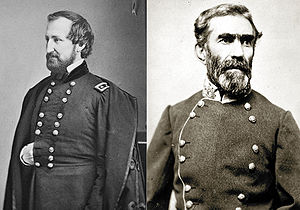| Tullahoma campaign | |||||||
|---|---|---|---|---|---|---|---|
| Part of the American Civil War | |||||||
 Commanding generals Rosecrans and Bragg | |||||||
| |||||||
| Belligerents | |||||||
|
|
| ||||||
| Commanders and leaders | |||||||
| William Rosecrans | Braxton Bragg | ||||||
| Strength | |||||||
| 50,000–60,000 | about 45,000 | ||||||
| Casualties and losses | |||||||
| 569 (83 killed, 473 wounded, and 13 captured or missing) | Total unknown, 1,634 captured | ||||||
The Tullahoma campaign (or Middle Tennessee campaign) was a military operation conducted from June 24 to July 3, 1863, by the Union Army of the Cumberland under Maj. Gen. William Rosecrans, and is regarded as one of the most brilliant maneuvers of the American Civil War. Its effect was to drive the Confederates out of Middle Tennessee and to threaten the strategic city of Chattanooga.
The Confederate Army of Tennessee under General Braxton Bragg occupied a strong defensive position in the mountains. But through a series of well-rehearsed feints, Rosecrans captured the key passes, helped by the use of the new seven-shot Spencer repeating rifle. The Confederates were handicapped by dissension between generals, as well as a lack of supplies, and soon had to abandon their headquarters at Tullahoma.
The campaign ended in the same week as the two historic Union victories at Gettysburg and Vicksburg, and Rosecrans complained that his achievement was overshadowed. However, Confederate casualties had been few, and Bragg's army soon received reinforcements that enabled it to defeat Rosecrans at the Battle of Chickamauga two months later.